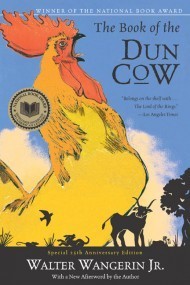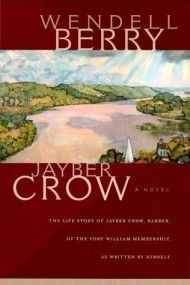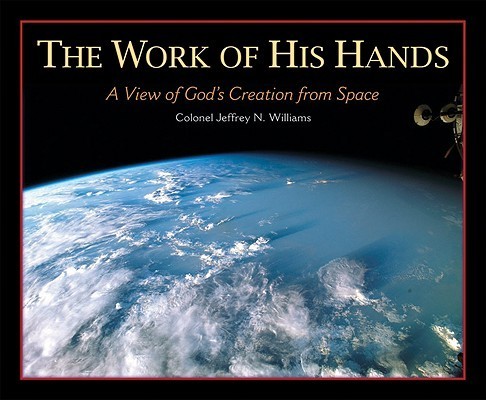Justin Taylor's Blog, page 286
September 21, 2011
An Interview with Larry Woiwode
John Wilson (editor of Books & Culture) sits down with novelist and essayist Larry Woiwode for a wide-ranging 45-minute discussion about life and literature. Woiwode has two new books out from Crossway: Words Made Fresh: Essays on Literature and Culture and The Invention of Lefse: A Christmas Story.
Thanks to Crossway's Ted Cockle for the time-stamp index:
00:48 Discussion about "homeplace"
7:27 Writers as truth tellers
12:38 Shakespeare's humility
15:51 The critics of John Updike
21:35 Tolstoy and a lived sense of time
24:04 The impact of John Calvin on Woiwode's life
32:04 The tension of an author/artist today (telling the truth about the world on one hand, and not being profane on the other)
40:07 Rumors of Larry's upcoming novel
43:36 On The Invention of Lefse
September 20, 2011
An Encouragement to Modern Hymn Writers
Let this be an encouragement to modern hymn writers—a cause for inspiration to those who are suffering from writer's block. There are so many Biblical scenes to choose from that would make for beautiful songs: the transfiguration of Christ, the feeding of the five thousand, the woman at the well, the stoning of Stephen, water baptism, washing of the disciple's feet, the betrayal of Judas. If just a few good modern hymn writers tackled some of these subjects, the anguish that untold thousands of music ministers suffer weekly could be greatly diminished.
It's easy to write a chorus that says:
God, you are a Holy God
I need your grace to see me through
I need your mercy to make me new
Let me live each day for you.
I just made that up in two minutes and there's nothing wrong with it. It might fit easily and competitively among the hundreds of worship songs that are available to choose from. But compare those lines to the third stanza from the above hymn:
Let holy charity mine outward vesture be,
And lowliness become mine inner clothing;
True lowliness of heart, which takes the humbler part,
And o'er its own shortcomings weeps with loathing.
It took some real thought to craft those lines. They're timeless. They set a standard for all of us who write music for the church. I didn't set out to write a didactic piece. I'm reminding myself, too.
Be specific when you write songs about God.
Avoid cliché.
Avoid convenience.
Avoid an obsession with the consumer.
Avoid the temptation to make commercial success your central goal.
Write with intelligence, employing all the craft, skill, and experience with which God has endowed you.
Read the whole post, which contains audio of Fernando singing the 15th century hymn "Come Down, O Love Divine" (quoted above).
Man Shall Not Live on Polemics Alone
Lloyd-Jones was standing in the tradition of Gillespie and Alexander. Polemics is medicine, not food. Without medicine we will surely die—we can't live without it. This is why "polemical theology" must be a required part of every theological curriculum. Yet we cannot live on medicine. If you engage in polemics with relish and joy—if polemics takes up a significant percentage or even a majority of your time and energy—it is like trying to live on medicine alone. It won't work for the church or for you.
Read the whole thing, and keep your eyes on this ongoing series. It's worth the read.
How to Write a Modern Hymn and a Scripture Memory Song
Bobby and Kristen Gilles's new website, My Song in the Night, contains a lot of wisdom for songwriters (and for a lot of others folks in the church, too).
For those interested in songwriting, here are some posts worth looking at:
Writing a Scripture Memorization Song
Writing a Modern Hymn
See also:
Songwriting Analysis: "All I Have Is Christ" by Jordan Kauflin
Internal Rhyme & Alliteration in "I Sing the Mighty Power of God" by Isaac Watts
Again, the site is more than just about songwriting. The whole thing is worth looking at.
The Hole in Our Holiness & Holiness by Grace
John Piper and Kevin DeYoung talk about holiness and the gospel:
A book that has perhaps not received the attention it deserves in this discussion is Bryan Chapell's Holiness by Grace: Delighting in the Joy That Is Our Strength.
"The historic Protestant doctrine is that we are not only justified by faith rather than our works, but we are also sanctified by faith rather than our works. Yet, though we give this teaching lip service, very few ministers and Christians know how grace-based sanctification really works. Bryan Chapell has produced a popular, practical, yet theologically sensitive book on this very issue—how God's gracious acceptance is the dynamic and guide for growth into holy character. This is a great book—an extremely timely book."
—Timothy Keller, Senior Pastor, Redeemer Presbyterian Church, New York City
"Grace. We have an entire vocabulary of adjectives to describe it when we sing about it. And yet—if the truth be told—we Christians either have a stubborn tendency to refuse really to believe it, or we stumble over its implications. In Holiness by Grace Bryan Chapell comes to help us."
—Sinclair B. Ferguson, Senior Pastor, First Presbyterian Church, Columbia, South Carolina
"In this study book, a wise man shows how the grace of God in Christ, and the holy joy of Christian living, go beyond what many think. Would you appreciate a fully biblical and Reformed demonstration of how the love-words and love-works of our triune God transform life? Then you should read and digest Holiness by Grace."
—J. I. Packer, Board of Governors' Professor of Theology, Regent College; author, Knowing God
You can read an excerpt here or below:
Four Recommended Fiction Books
Someone asked Andrew Peterson the other day for a few recommended works of fiction. He offered four suggestions. I've listed them below, in chronological order, with some additional details. All are written by novelists who are Christians from varying traditions.
Walter Wangerin Jr., The Book of the Dun Cow

Written in 1978
Won the 1980 National Book Award and The New York Times Best Children's Book of the Year.
"A book that nearly defies categorization—equal parts Watership Down, Lord of the Rings, Animal Farm . . . and The Canterbury Tales. It's the story of Chauntecleer the rooster, Lord of all he surveys, until the twisted and evil Cockatrice sets his eye and his armies upon the land. In the end Chaunticleer and his farmland subjects must stand together in the face of the destruction of the earth and the wakening of Wyrm. It's a story that's both intimate and epic, horrifying and humorous, dreadful and hopeful. I've never read anything else quite like it. Certainly one of my top 10 favorite books of all time. Has to be read to be believed."
—Pete Peterson
Frederick Buechner, Godric

Written in 1981
Nominated for a Pulitzer Prize
"In the extraordinary figure of Godric, both stubborn outsider and true child of God, both worldly and unworldly, Frederick Buechner has found an ideal means of exploring the nature of spirituality. Godric is a living battleground where God fights it out with the world, the Flesh, and the Devil."
— London Times Literary Supplement
Wendell Berry, Jayber Crow

Written in 2000
"One of our favorite books, by one of America's finest writers. If you've never read anything by Wendell Berry, this is as good a place to start as any. He's a poet, essayist, novelist, and farmer, skilled and well-respected at each. This book is part of the reason I forsook the suburbs and moved with my family to the Warren—not to escape community, but to enter into a deeper one."
—Andrew Peterson
Leif Enger, Peace Like a River

Written in 2001
Amazon.com's Book of the Year
John Piper wrote in his recommendation of the book:
There's faith in it, but not like your usual faith. More strange, like the Bible. . . .
What do I make of it? Wrong question.
What is it making of me?
More alive to everything true, I hope. More steady in the wind. More hopeful. Less anxious. Eager for Christ to show up.
September 19, 2011
"Should I Pray for a Husband?"
Carolyn McCulley, the author of Did I Kiss Marriage Goodbye? Trusting God with a Hope Deferred, writes:
Over several years of ministering to single women, I've heard one question asked repeatedly: "Should I pray for a husband?"
On the surface, it can seem an odd question, but I am sympathetic to the reasons why it is asked. Lurking behind that one question are many others:
"What if God doesn't answer this prayer?"
"Is this something I should even be focused on?"
"Is it selfish of me to want a husband?"
"Is God still good if I pray and I remain single?" and so forth.
You can read her answer here.
What Would It Look Like to Orbit the Earth?
Time-lapse from the International Space Station:
Colonel Jeff Williams—a member of the Lutheran Church-Missouri Synod—has seen this first hand. He has orbited the earth over 2,800 times, more than any person in history. He has also captured more photographs of earth than any person in history. You can view his 2006 photos and biblical reflections and commentary in the book The Work of His Hands: A View of God's Creation from Space. He says, "Spaceflight definitely gave me a new perspective on the world around us and provided a transcendent view of things above and beyond the immediate elements of life . . . viewing the earth from space brought a new significance to the truth of many familiar biblical texts." You can look inside the book here.
HT: Layne Henn
September 18, 2011
Answer: "They Can't"
How then will they call on him in whom they have not believed?
And how are they to believe in him of whom they have never heard?
And how are they to hear without someone preaching?
And how are they to preach unless they are sent?
—Romans 10:14-15
Break it down into simple theo-logical propositions and it looks like this:
No one can call upon Jesus if he doesn't believe in Jesus.
No one can believe Jesus or believe in Jesus if he hasn't heard Jesus or heard of Jesus.
No one can hear Jesus or hear of Jesus if no one preaches Jesus to him.
No one can preach Jesus to the unreached unless he is sent.
One implication: if you care about people hearing the gospel, believing in Jesus, and calling upon his name—especially where he is not yet named (Rom. 15:20)—then you cannot be indifferent to the twin tasks of "going and telling" and/or "supporting and sending."
"And [Jesus] said to them, 'The harvest is plentiful, but the laborers are few. Therefore pray earnestly to the Lord of the harvest to send out laborers into his harvest'" (Luke 10:2).
"You will do well to send them on their journey in a manner worthy of God" (3 John 1:6).
"How beautiful are the feet of those who preach the good news!" (Rom. 10:15; Isa. 52:7).
Justin Taylor's Blog
- Justin Taylor's profile
- 44 followers




